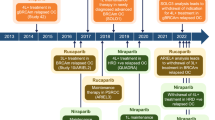Summary
Background Dysregulation of histone deacetylases (HDACs) is common in cancer and is critical to the development and progression of the majority of tumors. This first-in-human Phase Ia study assessed the safety, efficacy, and pharmacokinetics (PK) of OBP-801, a cyclic depsipeptide class I HDAC inhibitor. Methods Adult patients with advanced solid tumors were treated in 3 dose cohorts (1.0 mg/m2, 2.0 mg/m2 or 2.8 mg/m2) of OBP-801 that was administered via intravenous infusion weekly. Initially, an accelerated titration design was used that was followed by a 3 + 3 dose escalation strategy. Primary objective was assessment of safety. Secondary objectives included determination of PK and objective response rate. Results Seventeen patients were enrolled, of which 8 patients were evaluable for efficacy. Drug-related ≥ Grade 3 treatment-emergent adverse events included abdominal pain, anemia, fatigue, gamma glutamyl-transferase increase, hypertriglyceridemia and vomiting. No dose-limiting toxicity was observed in the 1.0 mg/m2 cohort. The PK data showed that OBP-801 and its active metabolite OBP-801-SH exposure increased proportionally and more than proportionally, respectively. No accumulation of either agent was noticed after repeat administration. Best response was stable disease (37.5%), with one patient each in the three cohorts. Conclusion Further investigations of the OBP-801 1.0 mg/m2 dose will be needed to better understand the efficacy of the agent, either alone or in combination.
Trial registration: NCT02414516 (ClinicalTrials.gov) registered on April 10, 2015.


Similar content being viewed by others
Data availability
The datasets analyzed during the study are available from the corresponding author on reasonable request and after approval from Oncolys Biopharma Inc., Tokyo, Japan.
Code availability
Not applicable.
References
Hrabeta J, Stiborova M, Adam V, Kizek R, Eckschlager T (2014) Histone deacetylase inhibitors in cancer therapy. A review. Biomed Pap Med Fac Univ Palacky Olomouc Czech Repub 158(2): 161–169. https://doi.org/10.5507/bp.2013.085
Kim HJ, Bae SC (2011) Histone deacetylase inhibitors: molecular mechanisms of action and clinical trials as anti-cancer drugs. Am J Transl Res 3(2):166–179
Marks PA, Richon VM, Miller T, Kelly WK (2004) Histone deacetylase inhibitors. Adv Cancer Res 91: 137–168. https://doi.org/10.1016/S0065-230X(04)91004-4
Roth SY,Allis CD (1996) Histone acetylation and chromatin assembly: a single escort, multiple dances? Cell 87(1): 5–8. https://doi.org/10.1016/s0092-8674(00)81316-1
Spange S, Wagner T, Heinzel T, Kramer OH (2009) Acetylation of non-histone proteins modulates cellular signalling at multiple levels. Int J Biochem Cell Biol 41(1): 185–198. https://doi.org/10.1016/j.biocel.2008.08.027
Bolden JE, Peart MJ, Johnstone RW (2006) Anticancer activities of histone deacetylase inhibitors. Nat Rev Drug Discov 5(9): 769–784. https://doi.org/10.1038/nrd2133
Trapp J,Jung M (2006) The role of NAD+ dependent histone deacetylases (sirtuins) in ageing. Curr Drug Targets 7(11): 1553–1560. https://doi.org/10.2174/1389450110607011553
Lee KK,Workman JL (2007) Histone acetyltransferase complexes: one size doesn't fit all. Nat Rev Mol Cell Biol 8(4): 284–295. https://doi.org/10.1038/nrm2145
Subramanian S, Bates SE, Wright JJ, Espinoza-Delgado I, Piekarz RL (2010) Clinical Toxicities of Histone Deacetylase Inhibitors. Pharmaceuticals (Basel) 3(9): 2751–2767. https://doi.org/10.3390/ph3092751
Le Tourneau C, Lee JJ, Siu LL (2009) Dose escalation methods in phase I cancer clinical trials. J Natl Cancer Inst 101(10): 708–720. https://doi.org/10.1093/jnci/djp079
Acknowledgements
All funding was provided by Oncolys BioPharma Inc.
Funding
The study was funded by Oncolys Biopharma Inc., Tokyo, Japan.
Author information
Authors and Affiliations
Contributions
EIH was primarily responsible for the study design, execution and supervision, as well as of writing of the manuscript. All authors contributed to the writing and/or revision of the manuscript, and approved its submission.
Corresponding author
Ethics declarations
Ethics approval
The study was performed in accordance with ethical principles that have their origin in the Declaration of Helsinki and are consistent with International Conference on Harmonization/Good Clinical Practice (ICH/GCP), applicable regulatory requirements and the policy on bioethics. This study was approved by the Wayne State University Institutional Review Board.
Consent to participate
All patients provided written informed consent about the nature, purpose, possible risk and benefit of the study.
Consent for publication
All authors and the sponsor of the study gave consent to publication of this study.
Open Access
Not Available.
Competing interests EIH
has received research funding from Oncolys BioPharma, Inc. She has served on advisory boards for Oncolys BioPharma, Inc., and Theradex Oncology. DD and RSU were both employees of Theradex Oncology during the period of the study. YU was an employee of Oncolys BioPharma, Inc. during the period of the study. AW and UV have nothing to declare.
Additional information
Publisher's Note
Springer Nature remains neutral with regard to jurisdictional claims in published maps and institutional affiliations.
Rights and permissions
About this article
Cite this article
Heath, E.I., Weise, A., Vaishampayan, U. et al. Phase Ia dose escalation study of OBP-801, a cyclic depsipeptide class I histone deacetylase inhibitor, in patients with advanced solid tumors. Invest New Drugs 40, 300–307 (2022). https://doi.org/10.1007/s10637-021-01180-9
Received:
Accepted:
Published:
Issue Date:
DOI: https://doi.org/10.1007/s10637-021-01180-9




